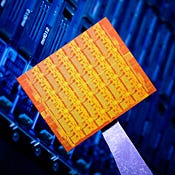Intel Demos 48-Core CPUIntel Demos 48-Core CPU
The single-chip cloud computer aims to dramatically boost performance and power efficiency in laptops, desktops, and servers.


Intel 48-Core CPU
(click image for larger view)
Intel 48-Core CPU
Intel has demonstrated an experimental 48-core processor that reflects a rethinking of the chip design in order to dramatically boost performance and power efficiency in future laptops, desktops, and servers.
Each core in the prototype shown off Wednesday by Intel researchers at the company's Santa Clara, Calif., headquarters is fully programmable and shares data over a high-speed on-chip network. Newly invented power management techniques keep energy consumption to as little as 25 watts and as much as 125 watts when the chip is running at maximum performance. That's about the same amount of power used by today's Intel's processors.
Researchers call the processor a "single-chip cloud computer," because its design resembles the organization of data centers used to support cloud-computing environments that deliver services over the Web.
Cloud data centers comprise tens of thousands of computers connected by a physically cabled network used to distribute large tasks and massive data sets in parallel. Intel uses a similar approach in the experimental processor, which is about the size of a postage stamp. The chip was built using Intel's 45-nanometer manufacturing process.
The high-speed network connecting cores in the experimental chip makes it possible for software to quickly pass information directly between cooperating cores in a matter of a few microseconds, reducing the need to access data in slower, off-chip system memory. Applications can also dynamically manage which cores are used for a given task at a given time, matching the performance and energy needs to the job.
Intel believes adding more cores is the best way to continuously increase processor performance. The company plans to release in 2010 a six-core processor codenamed Gulftown. The 32-nm processor will be based on Intel's upcoming Westmere microarchitecture.
Processors like the latest concept chip will make it possible to run more applications on fewer physical servers, thereby reducing the size of a data center while making the facility more power efficient, said Justin Rattner, chief technology officer for Intel.
"With a chip like this, you could imagine a cloud datacenter of the future which will be an order of magnitude more energy efficient than what exists today, saving significant resources on space and power costs," Rattner said in a statement. "Over time, I expect these advanced concepts to find their way into mainstream devices, just as advanced automotive technology such as electronic engine control, air bags, and anti-lock braking eventually found their way into all cars."
However, the speed at which processors with dozens of cores are adopted will depend on how fast programmers can develop software that takes advantage of the chips, which will require new development tools that simplify the complexity of building applications for such advanced technology. Researchers from Intel, Hewlett-Packard, and Yahoo have begun porting applications running on cloud computing environments to Intel's latest concept chip. The group is using Hadoop, an open-source distributed file system used to process massive amounts of data.
The three companies are working through Open Cirrus, a multi-data center, open source test bed for cloud computing research and education. Open Cirrus was created by Yahoo, HP, Intel, the University of Illinois at Urbana-Champaign, Singapore's Infocomm Development Authority, and Germany's Karlsruhe Institute of Technology.
Intel plans to build at least 100 of the experimental chips for use by dozens of industrial and academic researchers worldwide who are developing software applications and programming models for future many-core processors.
Microsoft is among the companies that have joined the effort. "Our early research with the single chip cloud computer prototype has already identified many opportunities in intelligent resource management, system software design, programming models and tools, and future application scenarios," Dan Reed, Microsoft's corporate VP of extreme computing, said.
Intel's latest many-core prototype was developed by researchers in the company's labs in Bangalore, India; Braunschweig, Germany; and Hillsboro, Ore. Details of the chip's architecture and circuits are scheduled to be published in a paper presented at the International Solid State Circuits Conference in February 2010.
For Further Reading:
About the Author
You May Also Like




